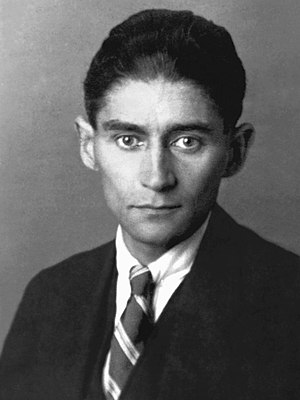“Its often safer to be in chains than to be free”
thought he could
hear what he could expect if he gave in, the delays and excuses would
begin again, reports of how the documents were progressing, how the mood
of the court officials had improved, as well as all the enormous
difficulties--in short all that he had heard so many times before would
be brought out again even more fully, he would try to mislead K. with
hopes that were never specified and to make him suffer with threats that
were never clear. He had to put a stop to that, so he said, "What will
you undertake on my behalf if you continue to represent me?" The lawyer
quietly accepted even this insulting question, and answered, "I should
continue with what I've already been doing for you." "That's just what I
thought," said K., "and now you don't need to say another word." "I will
make one more attempt," said the lawyer as if whatever had been making
K. so annoyed was affecting him too. "You see, I have the impression
that you have not only misjudged the legal assistance I have given you
but also that that misjudgement has led you to behave in this way, you
seem, although you are the accused, to have been treated too well or, to
put it a better way, handled with neglect, with apparent neglect. Even
that has its reason; it is often better to be in chains than to be free.
But I would like to show you how other defendants are treated, perhaps
you will succeed in learning something from it. What I will do is I will
call Block in, unlock the door and sit down here beside the bedside
table." "Be glad to," said K., and did as the lawyer suggested; he was
always ready to learn something new. But to make sure of himself for any
event he added, "but you do realise that you are no longer to be my
lawyer, don't you?" "Yes," said the lawyer. "But you can still change
your mind today if you want to." He lay back down in the bed, pulled the
quilt up to his chin and turned to face the wall. Then he rang.
Leni appeared almost the moment he had done so. She looked hurriedly at
K. and the lawyer to try and find out what had happened; she seemed to
be reassured by the sight of K. sitting calmly at the lawyer's bed. She
smiled and nodded to K., K. looked blankly back at her. "Fetch Block,"
said the lawyer. But instead of going to fetch him, Leni just went to
the door and called out, "Block!
But I’m not guilty,” said K. “there’s been a mistake. How is it even possible for someone to be guilty? We’re all human beings here, one like the other.” “That is true” said the priest “but that is how the guilty speak
I knew nothing of
that," said K. "I came here to show the cathedral to a gentleman from
Italy." "That is beside the point," said the priest. "What are you
holding in your hand? Is it a prayer book?" "No," answered K., "it's an
album of the city's tourist sights." "Put it down," said the priest. K.
threw it away with such force that it flapped open and rolled across
the floor, tearing its pages. "Do you know your case is going badly?"
asked the priest. "That's how it seems to me too," said K. "I've
expended a lot of effort on it, but so far with no result. Although I do
still have some documents to submit." "How do you imagine it will end?"
asked the priest. "At first I thought it was bound to end well," said
K., "but now I have my doubts about it. I don't know how it will end. Do
you know?" "I don't," said the priest, "but I fear it will end badly.
You are considered guilty. Your case will probably not even go beyond a
minor court. Provisionally at least, your guilt is seen as proven."
"But I'm not guilty," said K., "there's been a mistake. How is it even
possible for someone to be guilty? We're all human beings here, one
like the other." "That is true," said the priest, "but that is how the
guilty speak." "Do you presume I'm guilty too?" asked K. "I make no
presumptions about you," said the priest. "I thank you for that," said
K. "but everyone else involved in these proceedings has something
against me and presumes I'm guilty. They even influence those who
aren't involved. My position gets harder all the time." "You don't
understand the facts," said the priest, "the verdict does not come
suddenly, proceedings continue until a verdict is reached gradually."
"I see," said K., lowering his head. "What do you intend to do about
your case next?" asked the priest. "I still need to find help," said
K., raising his head to see what the priest thought of this. "There are
still certain possibilities I haven't yet made use of." "You look for
too much help from people you don't know," said the priest
disapprovingly, "and especially from women. Can you really not see
that's not the help you need?" "Sometimes, in fact quite often, I could
believe you're right," said K., "but not always.
